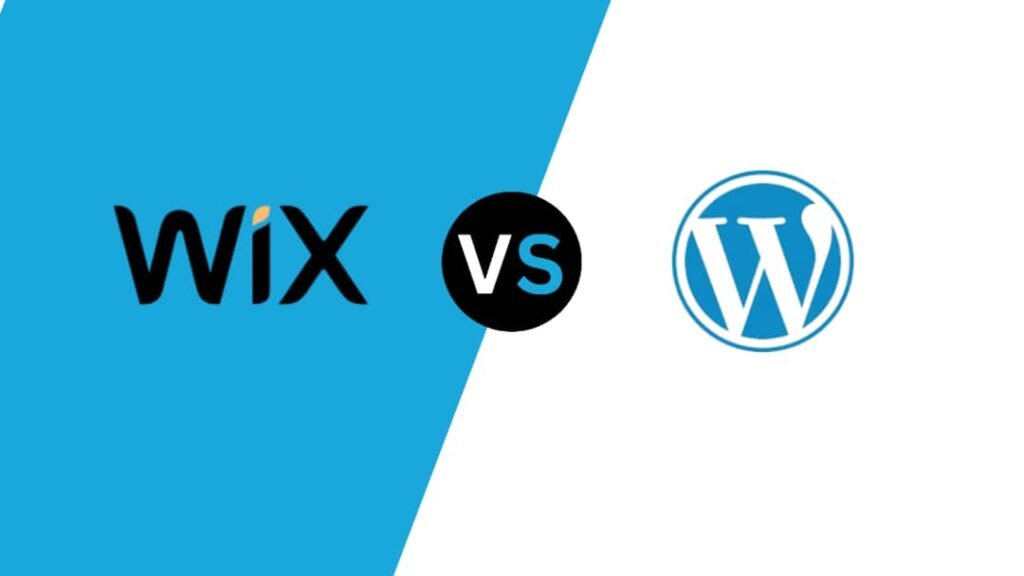
1. Introduction
Choosing the right website builder is important if you want to establish a strong online presence in 2025. The platform you select will influence how well your website functions, how easy it is for users to navigate, and how scalable it will be as your needs evolve. With so many options available today, Wix and WordPress are two of the most popular choices, each catering to different needs and skill levels.
Wix is known for its simplicity, offering a beginner-friendly, drag-and-drop interface that makes it quick and easy to build a website without technical skills. On the other hand, WordPress is a powerful content management system (CMS) that gives users full control, flexibility, and scalability—ideal for those with more advanced needs or technical knowledge.
This blog will explore a detailed Wix vs WordPress comparison, focusing on features, ease of use, pricing, and which option works best for different goals and user needs. By the end, you’ll have a clearer idea of which website builder is the right choice for you in 2025.
2. Overview: Wix vs WordPress
When deciding on a website-building platform, Wix and WordPress are two of the most popular options to consider. Each offers unique features tailored to different users, depending on their goals, technical skills, and specific needs. In this section, we’ll explore what sets Wix and WordPress apart, how they work, and why each platform might be the right choice for you
2.1 What is Wix?
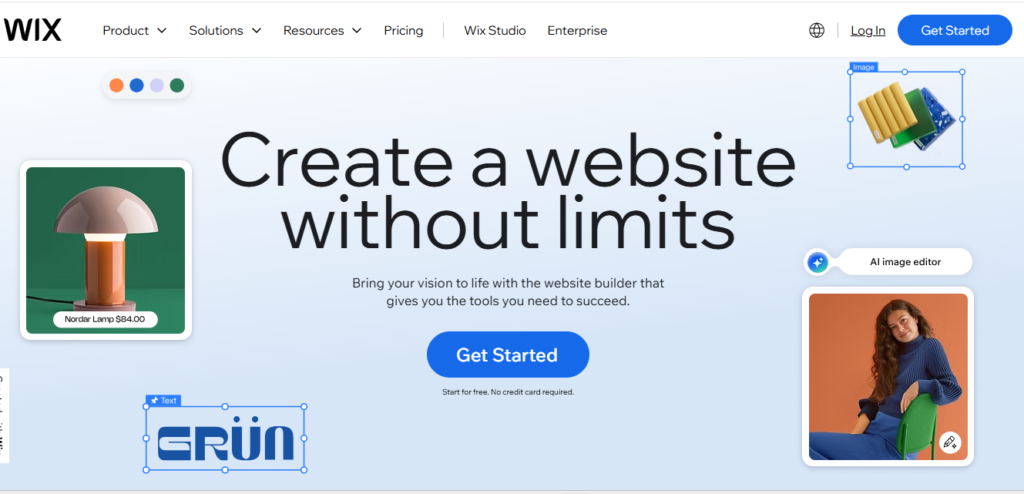
Wix is a cloud-based, all-in-one website building platform that focuses on simplicity and ease of use. It offers a drag-and-drop interface that allows users to build professional-looking websites without needing any technical knowledge or coding skills. This makes it an excellent choice for beginners, freelancers, small business owners, or anyone looking to launch a personal website quickly and without hassle.
One of Wix’s major selling points is its all-in-one hosting and website-building package. When you sign up for Wix, you don’t need to worry about finding external hosting providers or dealing with complex server settings. Everything from design, hosting, and maintenance is included in one seamless platform, making it user-friendly and straightforward.
Wix is particularly popular for:
- Small business websites.
- Personal portfolios and creative projects.
- Quick website creation without learning coding.
Its intuitive design interface offers over 800 pre-designed templates that users can select and customize easily. These templates are mobile-responsive, ensuring that your website looks great across devices. Wix also provides built-in e-commerce capabilities, allowing users to set up small online stores directly from their website with minimal technical skills.
However, Wix’s ease of use comes with limitations, such as restricted flexibility for advanced customization and challenges with scalability for larger, complex websites. Despite this, it remains one of the most beginner-friendly and practical solutions available today.
2.2 What is WordPress?
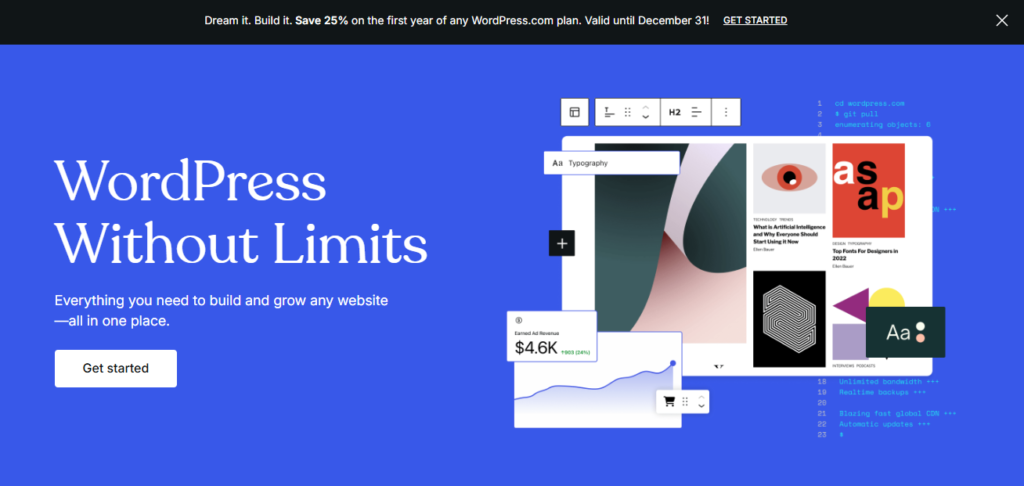
WordPress is a powerful, open-source content management system (CMS) that has become the backbone of over 40% of websites across the internet. Unlike Wix’s all-in-one, hosted solution, WordPress is self-hosted, meaning users need to find their own hosting provider to get started. While this adds a level of complexity, it also offers unmatched customization, scalability, and flexibility for advanced users, businesses, and developers.
WordPress’s CMS allows users to manage their website’s content easily while providing countless options to extend its functionality through plugins and themes. Its versatility allows it to cater to a wide range of website types, from simple personal blogs to complex e-commerce sites and membership platforms.
Key features of WordPress:
- Open-source nature: WordPress allows developers and users to tweak the code and customize their websites extensively.
- Flexibility: Users can design their websites from scratch or choose from thousands of themes.
- Plugins: WordPress provides an extensive library of over 50,000 plugins, which can add features such as SEO tools, social media integrations, and advanced analytics.
- Scalability: WordPress can scale to support small websites as well as very large and complex e-commerce platforms.
Setting up a WordPress site requires some technical expertise, particularly for installing themes, choosing plugins, and managing hosting. However, the reward is complete freedom to build and scale your website as needed without being locked into a single platform structure.
WordPress works well for:
- Bloggers and writers.
- Online stores with custom product needs.
- Large-scale businesses with long-term website goals.
- Website projects requiring advanced customization options.
2.3 Quick Comparison Table: Wix vs WordPress
To provide a clear visual comparison between the two platforms, here’s a quick breakdown of their vital features:
| Feature | Wix | WordPress |
|---|---|---|
| Hosting | All-in-one hosting included. | Requires separate hosting. |
| Customization Options | Limited to Wix’s templates and options. | Highly customizable through themes and coding. |
| Scalability | Best for small to medium-sized sites. | Ideal for websites of all sizes. |
| SEO Tools | Basic SEO tools included. | Advanced SEO capabilities with plugins like Yoast SEO. |
| Learning Curve | Minimal; easy to set up. | Steeper learning curve with advanced features. |
| Pricing | Tiered subscription plans include hosting. | Free to start but requires payment for hosting, themes, and plugins. |
| Maintenance | Wix handles updates and maintenance. | Requires regular updates and management by the user. |
| Community/Support | Access to Wix’s customer support. | Large online community and extensive documentation. |
3. Features Comparison: Wix vs WordPress
| Feature | Wix | WordPress |
|---|---|---|
| 3.1 Design and Customization | ||
| – Pre-designed Templates | Over 800 pre-designed templates. | Thousands of free and premium themes. |
| – Editing Interface | Drag-and-drop editor for non-technical users. | Full design control through coding (HTML/CSS). |
| – Flexibility in Customization | Limited flexibility in switching templates. | Flexibility to switch and customize themes. |
| 3.2 Ease of Use | ||
| – User Interface | Beginner-friendly interface with a guided setup process. | Steeper learning curve but offers more advanced customization options. |
| 3.3 E-Commerce Capabilities | ||
| – E-commerce Plans | Built-in e-commerce plans for small online stores. | WooCommerce plugin for full-fledged e-commerce. |
| – Scalability | Limited scalability for large businesses. | Scalability for large, complex online stores. |
| 3.4 SEO Features | ||
| – SEO Tools | Basic SEO tools: Meta tags, mobile-friendly designs, and built-in analytics. | Advanced SEO capabilities with plugins like Yoast SEO. |
| – Technical SEO | Limitations in technical SEO (e.g., URL structure). | Full control over technical SEO elements. |
| 3.5 App and Plugin Ecosystem | ||
| – App/Plugin Market | Limited app market but tightly integrated tools. | Vast library of plugins for everything from SEO to advanced analytics. |
4. Performance and Hosting:Wix vs WordPress
When comparing Wix and WordPress in terms of performance and hosting, there are key differences to consider. With Wix, hosting is included as part of its subscription plans, which means you don’t have to worry about finding a separate hosting provider. Wix’s hosting offers good uptime and speed, ensuring that your website remains accessible to visitors. However, one drawback is that you have limited control over performance optimization. This means you rely mostly on Wix’s built-in features to ensure the website runs smoothly, without being able to make advanced changes.
On the other hand, WordPress offers much more flexibility when it comes to hosting, but it comes with added responsibility. WordPress doesn’t come with built-in hosting—you’ll need to select your own hosting provider, such as Bluehost or SiteGround. While this gives you more options to choose a hosting plan that aligns with your needs, it also means you have full control over performance optimizations. You can adjust server settings, use caching plugins, and implement other performance-boosting strategies to ensure your website loads quickly and efficiently.
5. Pricing: Wix vs WordPress
When it comes to pricing, Wix and WordPress have different models, and understanding these differences can help you determine which platform offers better value for your specific needs.
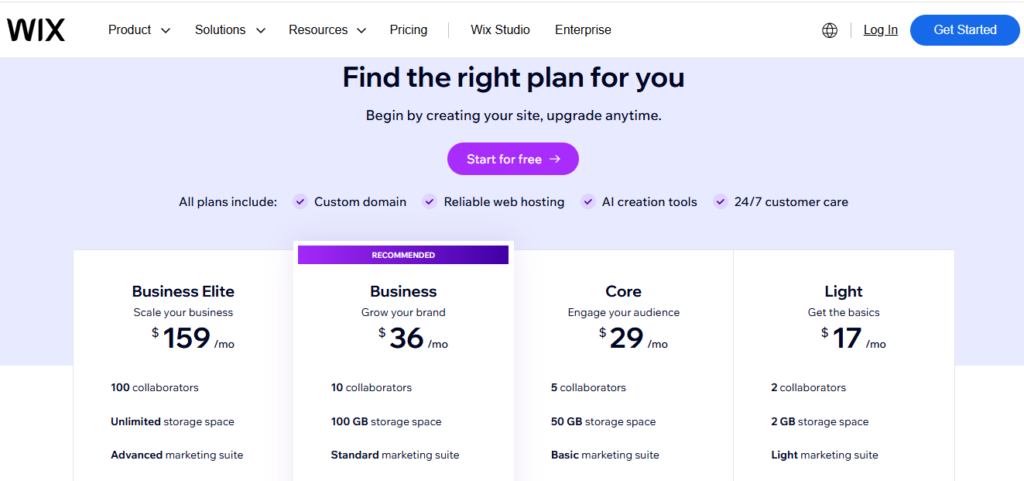
Wix offers a clear and tiered pricing structure designed to suit various user needs. Their plans, as shown above, range from the entry-level Light plan at $17/month to the advanced Business Elite plan at $159/month. These plans include key features such as hosting, a custom domain, reliable web hosting, AI creation tools, and 24/7 customer support. This all-in-one pricing model is ideal for beginners or small business owners seeking convenience and simplicity without having to worry about additional technical setups. However, while the plans are user-friendly and offer good value, users seeking advanced customization or significant scalability might find the flexibility somewhat limited.
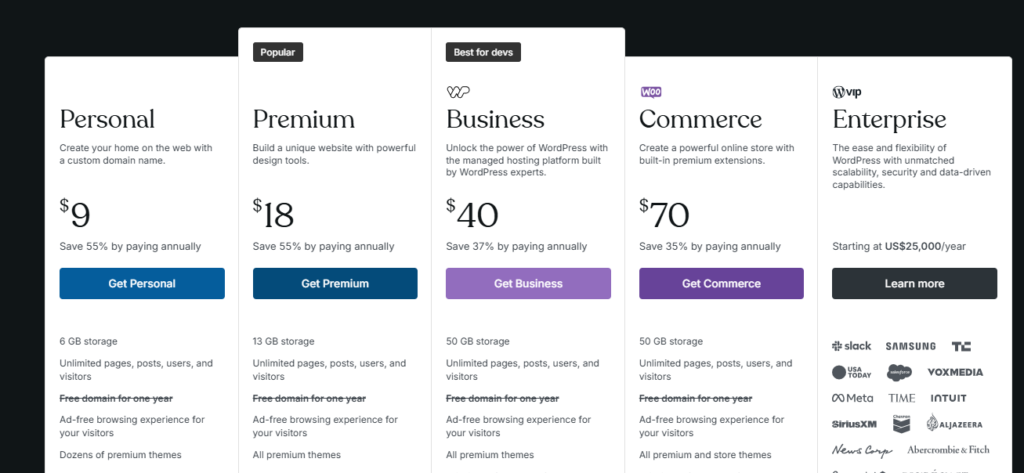
WordPress takes a more flexible approach to pricing, giving users the freedom to start small and scale up based on their needs. While the WordPress software itself is free, building a fully functional site typically involves additional costs. You’ll need to invest in hosting services (e.g., Bluehost, SiteGround), premium themes, and plugins to unlock advanced features and customizations.
As shown in the image below, WordPress.com offers tiered plans ranging from $9/month for Personal to $70/month for Commerce, catering to users with varying needs. For developers or businesses with specific requirements, the Business plan at $40/month provides advanced tools and scalability. There’s even an Enterprise solution for large-scale projects starting at $25,000/year.
This flexible pricing structure makes WordPress an excellent choice for those who want control over their website’s growth and are willing to pay for features as they scale. However, the costs can add up quickly if you require extensive customization or additional functionalities.
6. Pros and Cons: Wix vs WordPress
In Wix vs WordPress compariosn, Both platforms have their strengths, catering to different needs and skill levels. Wix is perfect for beginners and small businesses, offering simplicity and an all-in-one solution. On the other hand, WordPress provides unmatched flexibility and scalability, ideal for complex websites and users with technical expertise.
To help you decide, let’s explore the pros and cons of both platforms, highlighting their unique advantages and potential drawbacks.
6.1 Wix: Pros and Cons
| Pros | Cons |
|---|---|
| Beginner-Friendly and Quick Setup: Wix offers an intuitive drag-and-drop interface, making it accessible for users without technical expertise. | Limited Customization and Scalability: While suitable for small to medium-sized websites, Wix may not accommodate complex projects requiring advanced customization. |
| All-in-One Solution with Built-in Hosting: Wix provides hosting, security, and design tools within its platform, simplifying the website creation process. | Non-Transferable Sites: Migrating a website from Wix to another platform can be challenging, often requiring a complete rebuild. |
| Extensive Template Collection: With a vast array of modern and professional templates, users can create aesthetically pleasing websites tailored to various industries. | Limited Flexibility in Template Switching: Once a site is live, changing templates requires rebuilding content, which can be time-consuming. |
| Automatic Backups and Security: Wix automatically creates backup points, ensuring data protection and site security without user intervention. | Wix Branding on Free Plans: Free versions of Wix include Wix advertisements, which may not present a fully professional appearance. |
| App Market for Extended Features: Wix’s App Market allows users to enhance their sites with additional functionalities, such as contact forms and e-commerce tools. | SEO Limitations: While Wix offers basic SEO tools, it may lack advanced capabilities required for comprehensive search engine optimization. |
6.2 WordPress: Pros and Cons
| Pros | Cons |
|---|---|
| Unparalleled Flexibility and Scalability: WordPress’s open-source nature allows for extensive customization, making it suitable for a wide range of websites, from blogs to large e-commerce stores. | Steeper Learning Curve: New users may find WordPress’s vast array of features and customization options overwhelming, requiring time to learn and effectively utilize. |
| Rich Ecosystem of Plugins and Themes: With thousands of plugins and themes available, users can enhance functionality and design to meet specific requirements. | Requires Managing Hosting, Updates, and Security: Users are responsible for selecting hosting providers, performing regular updates, and implementing security measures, which can be time-consuming and require technical knowledge. |
| SEO and E-commerce Friendly: WordPress is designed to be search engine friendly, and plugins like WooCommerce facilitate the creation of robust online stores. | Potential for Plugin Conflicts: Using multiple plugins can lead to compatibility issues, affecting site performance and requiring troubleshooting. |
| Active Community and Support: A large, active community offers extensive resources, tutorials, and forums for troubleshooting and learning. | Customization May Require Advanced Knowledge: Achieving specific functionalities or designs might necessitate coding skills or hiring a developer. |
| Cost-Effective: The core WordPress software is free, and users can choose from a range of free or premium plugins and themes, allowing for budget flexibility. | Ongoing Maintenance: Regular updates and backups are essential to maintain site security and performance, adding to the user’s responsibilities. |
7. Best Use Cases: When to Choose Wix or WordPress
Choosing the right platform depends on your website goals, technical skills, and project requirements. Here’s a breakdown of when each platform excels:
7.1 When to Choose Wix
Wix is an excellent choice if you’re looking for:
- Personal Websites: Ideal for portfolios, resumes, or hobby sites that require a polished look with minimal effort. Wix’s drag-and-drop interface and pre-designed templates make it easy to create visually appealing personal websites.
- Small Businesses: Perfect for local businesses, such as cafes, salons, or boutique stores, that need an online presence. Wix provides built-in tools for booking systems, contact forms, and basic e-commerce for selling products or services.
- Quick Setup and Ease of Use: If you need a website up and running quickly without dealing with hosting, coding, or complex setups, Wix’s all-in-one solution streamlines the process.
Example Scenarios:
- A photographer showcasing their portfolio with a professional yet easy-to-maintain website.
- A local bakery needing an online store for customers to order cakes and pastries.
- An individual creating a blog or personal brand without technical knowledge.
7.2 When to Choose WordPress
WordPress is the go-to platform for projects that require:
- Blogs and Content-Heavy Sites: Originally built for blogging, WordPress remains the best choice for blogs or websites with frequent updates. Its rich blogging tools and SEO plugins ensure your content reaches the right audience.
- Large E-Commerce Sites: For comprehensive online stores with advanced features, WordPress paired with WooCommerce offers unmatched scalability and flexibility. It supports multiple payment gateways, inventory management, and custom integrations.
- Custom Functionality: If your project involves unique features, such as forums, membership sites, or multi-language support, WordPress’s vast plugin ecosystem and coding options provide the tools to achieve your vision.
Example Scenarios:
- A technology blogger publishing in-depth articles with categorized archives and related post suggestions.
- An enterprise launching a large online store with thousands of products, detailed analytics, and tailored user experiences.
- A nonprofit organization needing a multilingual site with donation features and event management.
8. Real-World Examples of Websites: Wix vs WordPress
Exploring real-world examples helps highlight the unique strengths of Wix and WordPress. Below are notable cases where these platforms excelled in meeting the specific needs of users.
8.1 Websites Built with Wix
Wix is popular among small businesses, creatives, and individuals seeking a professional online presence without extensive technical know-how.
- Small Businesses
- Amelia’s Flower Shop: This local flower shop uses Wix to showcase its vibrant floral arrangements and enable customers to place orders online. Its clean design, integrated booking system, and user-friendly navigation are perfect for a small business.
- RedBamboo: A restaurant with a stylish Wix-built website that displays its menu, allows reservations, and features customer testimonials. The mobile optimization ensures a seamless experience for users on the go.
- Creatives and Freelancers
- Photoflexas: Showcases their portfolio with Wix’s stunning templates, highlighting high-quality visuals and creating a strong first impression. click here to read more creatives and freelancers
- Personal Websites
- Laura Baross: Enthusiast shares her stories on an aesthetically pleasing Wix site. The simple drag-and-drop features make it easy to update regularly.
8.2 Websites Built with WordPress
WordPress is the preferred choice for businesses, bloggers, and organizations requiring extensive features, scalability, or custom functionality.
- Blogs and News Platforms
- TechCrunch: A leading technology blog built on WordPress, known for its robust architecture that handles high traffic while supporting multimedia content and interactive features.
- Ftalk.space: A business, marketing and personal finance blog that leverages WordPress’s blogging tools and SEO plugins to attract readers worldwide.
- E-Commerce Sites
- Tonal: is an online service that provides home-based personal health solutions, with custom filters and payment integrations.
- Blue Star Coffee Roasters: A coffee brand running a scalable e-commerce website on WordPress with WooCommerce, offering subscriptions and global shipping options.
- Corporate and Educational Websites
- BBC America: Built with WordPress, this website handles a large volume of content and traffic while delivering seamless user experiences.
- Harvard Gazette: Harvard University’s news website uses WordPress for its content management capabilities, ensuring easy updates and high performance.
9.Conclusion: Wix vs WordPress
Choosing between Wix and WordPress depends on your goals and level of technical expertise. Wix is perfect for those who want simplicity. It offers an all-in-one platform with drag-and-drop functionality, built-in hosting, and easy-to-understand pricing. This makes it an excellent choice for beginners, small businesses, or individuals looking to get a website up and running quickly without much hassle.
WordPress, on the other hand, is a powerhouse when it comes to customization and scalability. It’s the go-to option for bloggers, large e-commerce businesses, or anyone needing advanced features. While it has a steeper learning curve, WordPress offers unmatched flexibility in design, functionality, and SEO control. To get started, you can explore Wix’s free trial or choose a hosting provider like Bluehost for WordPress to simplify the setup process. No matter which platform you choose, both can help you build a professional online presence tailored to your needs.
Are you exploring more tools to grow your business or enhance your projects? Don’t miss out on my previous blog posts where I dive into comparisons like PayPal vs Stripe, Squarespace vs Shopify, Hootsuite vs Buffer, and ClickUp vs Monday.com. Each post is packed with insights to help you choose the right tools for your needs—check them out and make an informed decision today
10. Frequently Asked Questions (FAQs): Wix vs WordPress
1. Is WordPress harder to use than Wix?
Yes, WordPress has a steeper learning curve compared to Wix. While Wix offers a drag-and-drop interface perfect for beginners, WordPress requires users to understand hosting, themes, plugins, and sometimes coding. However, with time, WordPress becomes more intuitive and offers greater flexibility.
2. Which is better for SEO, Wix or WordPress?
WordPress is generally better for SEO due to its advanced plugins like Yoast SEO and Rank Math, which provide granular control over meta tags, schema, and sitemaps. While Wix offers basic SEO tools like meta tags and mobile optimization, it lacks the technical depth and flexibility that WordPress provides.
3. Can I migrate my Wix site to WordPress later?
Yes, you can migrate your Wix site to WordPress, but it’s not a seamless process. It requires manual content export, and you may need to redesign the website since Wix’s templates and structure are not transferable. Hiring a professional can simplify this migration.
4. Which platform is cheaper, Wix or WordPress?
Wix has tiered pricing plans that include hosting, security, and basic features, making it a predictable monthly cost. WordPress is free to use but requires separate expenses for hosting, themes, and plugins. While WordPress can be costlier initially, it offers more value and scalability in the long run.
5. Is Wix suitable for e-commerce?
Yes, Wix is suitable for small to medium e-commerce stores. It offers built-in e-commerce plans, payment integrations, and simple store management tools. However, WordPress with WooCommerce is better for large-scale, feature-rich e-commerce sites due to its scalability and advanced customization options.
6. Do Wix and WordPress offer customer support?
- Wix: Provides 24/7 customer support, including live chat and phone assistance, making it easier for beginners to get help.
- WordPress: Being open-source, it doesn’t have a centralized support team. Instead, users rely on community forums, tutorials, and support from hosting providers.
7. Can I use my own domain with Wix and WordPress?
- Wix: Allows you to purchase or connect your domain directly through their platform.
- WordPress: Requires purchasing a domain from a registrar (e.g., Namecheap or GoDaddy) and connecting it through your hosting provider.
8. Which platform offers better customization?
WordPress wins in customization as it provides full control over design, functionality, and features through coding and plugins. Wix, while user-friendly, is limited in flexibility and doesn’t allow access to its backend code.
9. Can I switch templates or themes after creating my website?
- Wix: Once you choose a template, you can’t switch it without rebuilding your website.
- WordPress: Allows you to switch themes at any time, preserving your content and providing more flexibility.
10. Is Wix or WordPress better for beginners?
Wix is better for beginners due to its intuitive interface, guided setup, and all-in-one solution. WordPress, while more complex initially, is suitable for those willing to invest time in learning for long-term scalability.
11. Which platform is better for blogs?
WordPress is the gold standard for blogging due to its advanced features, SEO tools, and wide array of themes. While Wix supports blogging, its features are basic in comparison.


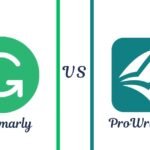
Pingback: Demio vs Livestorm: Top Marketing Webinar Tools Compared